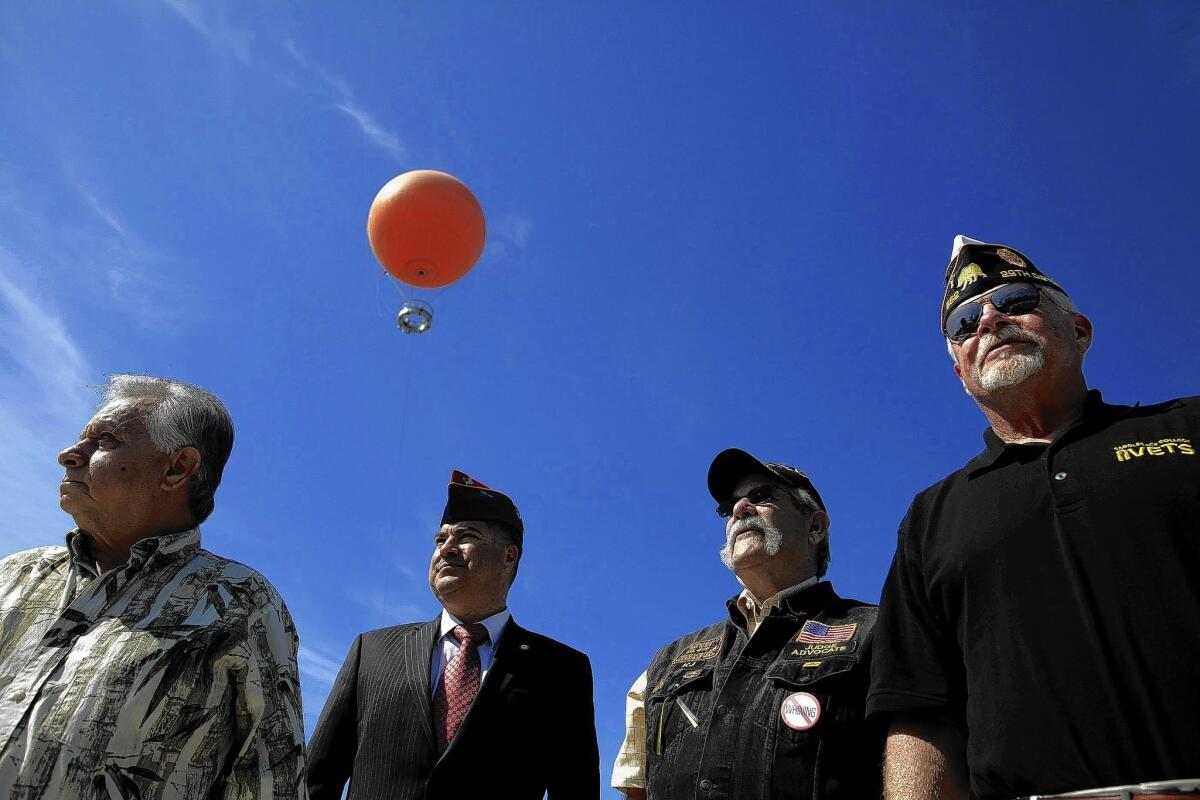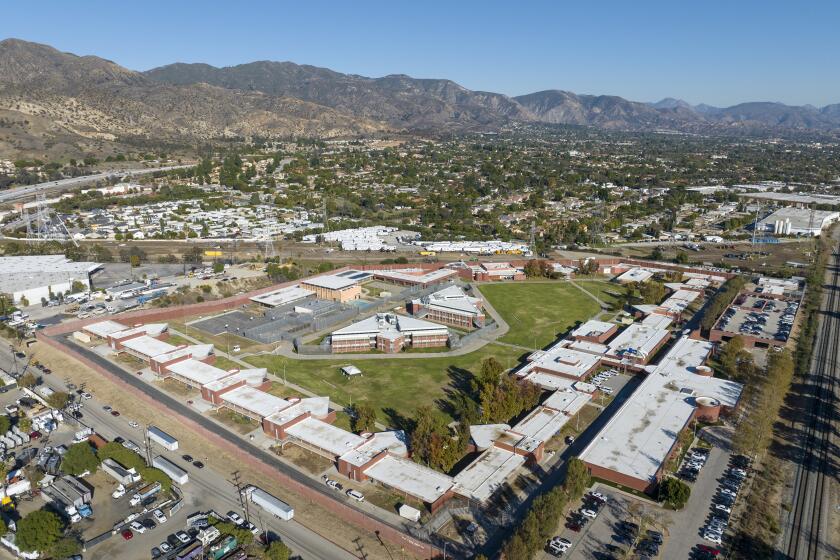O.C. veterans propose cemetery on former Marine base

- Share via
When American Legion Chaplain Bill Cook peered through the chain-link fence at the windswept landscape — a broken runway, scrubby fields and green foothills in the distance — he remembered the Phantoms.
The fighter jets were once a regular sight, slicing through the air over what was for decades a bustling military base.
“The jets would just roar,” he said on a recent afternoon at the old U.S. Marine Corps Air Station El Toro.
Now the Vietnam veteran is leading the charge to transform a small piece of that land into a final resting place for Orange County’s veterans.
Cook and others have been pushing for a veterans cemetery here since El Toro closed in 1999, but the idea is finally gathering steam as the old base is transformed into a sprawling park and neighborhoods of new homes.
The proposal has gained the support of legislators, county supervisors, city officials and veterans groups, though some have worried about a sustainable funding source.
But the most daunting hurdle may well be placing a cemetery next to planned tracts of homes that are being marketed to Asians.
The developer who is building the thousands of homes on the rim of the Orange County Great Park has consulted a feng shui master to review the names of streets, the bends in the roadways and the design of the homes to ensure a proper flow of energy.
In a city that is already 40% Asian, it is expected that the new homes — many which will hit the market with listing prices over $1 million — will be sold to buyers arriving from Asia.
And a cemetery is simply bad feng shui.
::
In the early 1940s, when the base was teeming with soldiers training for war, the airfield was isolated among vast orange and avocado groves.
But as the high-end suburbs of South County fanned out, the base became hemmed in by tract homes, schools and shopping centers. The Marines finally left in 1999.
What they left behind was an enormous stretch of land, about 4,600 acres dotted with abandoned barracks and hangars and crisscrossed with runways. The transformation into parkland, sports fields and homes follows years of legal disputes and political wrangling.
Bill Sandlin, a member of the Orange County Veterans Memorial Park Committee, believes there’s still room here for those who served their country.
“I want to do all I can to make sure this place maintains some of its Marine identity,” said Sandlin, who transported Marines headed for the brig between the base and Camp Pendleton in the early 1960s.
Local veterans say the former base would be the perfect site for a much-needed military cemetery in a region with a growing — and aging — population of veterans.
The sprawling Los Angeles National Cemetery in Westwood has been closed to new burials for about 20 years, and the Riverside National Cemetery is miles from Orange and Los Angeles counties, far more populated areas.
Stephen Jorgensen, who oversees memorials and cemeteries for the California Department of Veterans Affairs, estimated that about 14,000 veterans die every year in Orange and Los Angeles counties. The Riverside cemetery, which Jorgensen ran for more than a decade, handles about 8,000 burials each year.
“I know we didn’t serve a lot of people out of those two counties, even though Riverside is the most active veterans cemetery in the country,” Jorgensen said.
In January, Assemblywoman Sharon Quirk-Silva (D-Fullerton) introduced a bill that would ask the federal Department of Veterans Affairs for a grant to create a state-run Southern California Veterans Cemetery in Orange County.
While the state would have to pay for its operation and upkeep, the federal government would be asked to come through with a grant for its construction.
In Irvine, where the retired base is located, the council has endorsed the idea and formed a committee charged with finding space in the park for a cemetery.
And if an Orange County state veterans cemetery becomes a reality, Jorgensen said, it could end up being the busiest in the country.
::
But all that could collide with Emile Haddad’s vision for the Orange County Great Park and the areas surrounding it.
Haddad, president and chief executive of FivePoint Communities, sees neighborhoods of houses with shaded front porches, big, grassy backyards and easy access to the sports fields and tennis courts at the Great Park — a walkable community that harks back to a kind of “Dennis the Menace” era, he says.
FivePoint’s plan for the park itself, which the company agreed to help the city develop, includes vast amounts of parkland, including trails, a golf course, a wildlife corridor and a sports complex that would be twice the size of Disneyland.
What it does not include is a cemetery.
Haddad stressed that, in the end, the decision about whether to pursue a veterans cemetery in the park is the city’s.
“The land is not my land,” Haddad said.
Still, he said, it’s his job to make homes in FivePoint neighborhoods appealing to the people who want to buy them. And that market in Irvine is now dominated by Asian buyers.
Pavilion Park, one of the new neighborhoods, features multigenerational homes, with in-law units and side entrances.
While FivePoints declined to have its feng shui consultant speak with a reporter, Simona Mainini, a Beverly Hills-based feng shui master, said having a cemetery in the park could definitely lead to an “exponential” drop in property values.
“The bigger the cemetery, the farther away it should be from the residential area,” she said.
Haddad said FivePoint had “been extremely respectful of people who served on this base.”
Trees from the base were boxed to be replanted, and a veterans memorial on the grounds is in the works.
Veterans, though, see an allotment of the space as a small price to pay to honor those who left from El Toro and never came back.
jill.cowan@latimes.com
Twitter: @JillCowan
More to Read
Sign up for Essential California
The most important California stories and recommendations in your inbox every morning.
You may occasionally receive promotional content from the Los Angeles Times.













